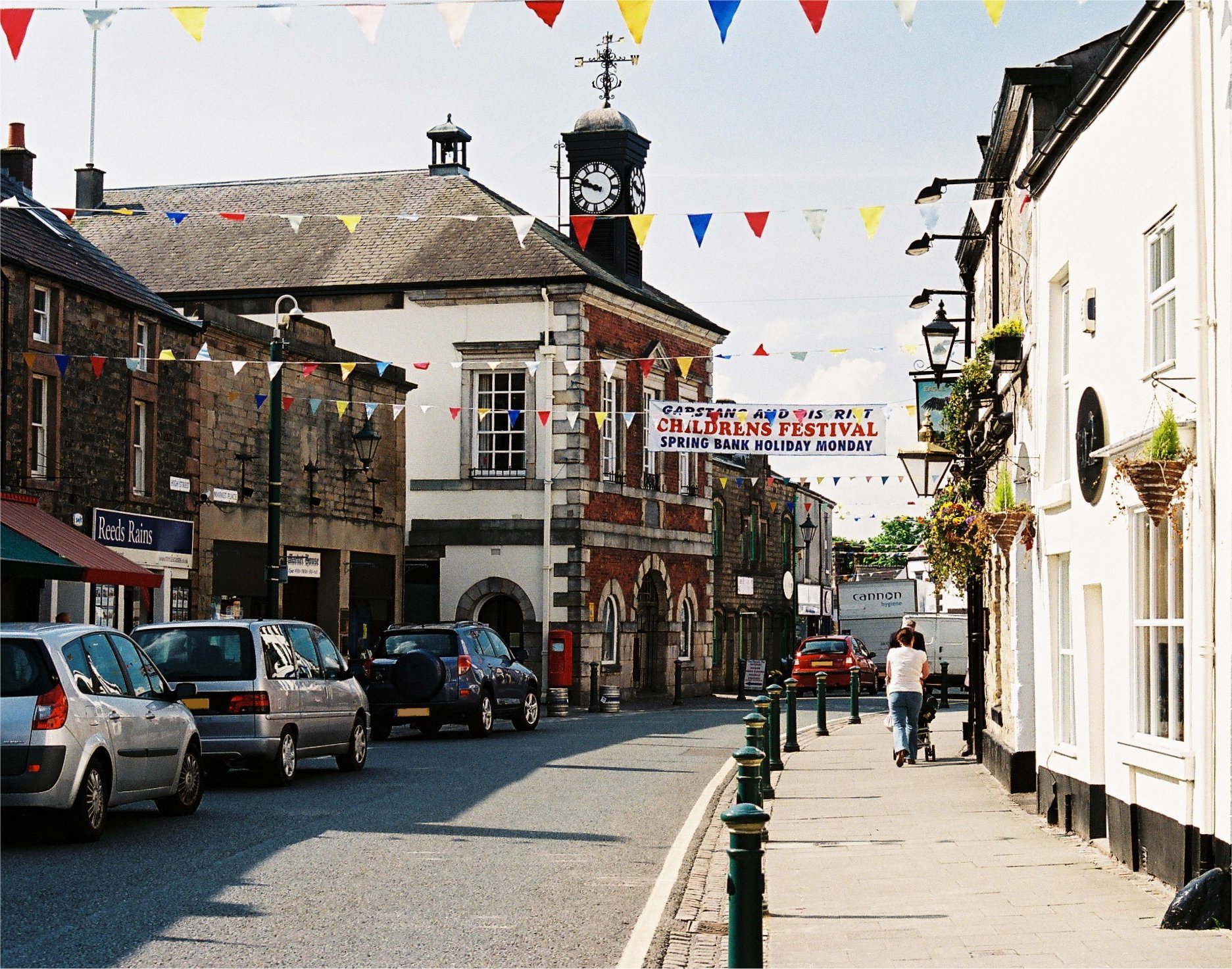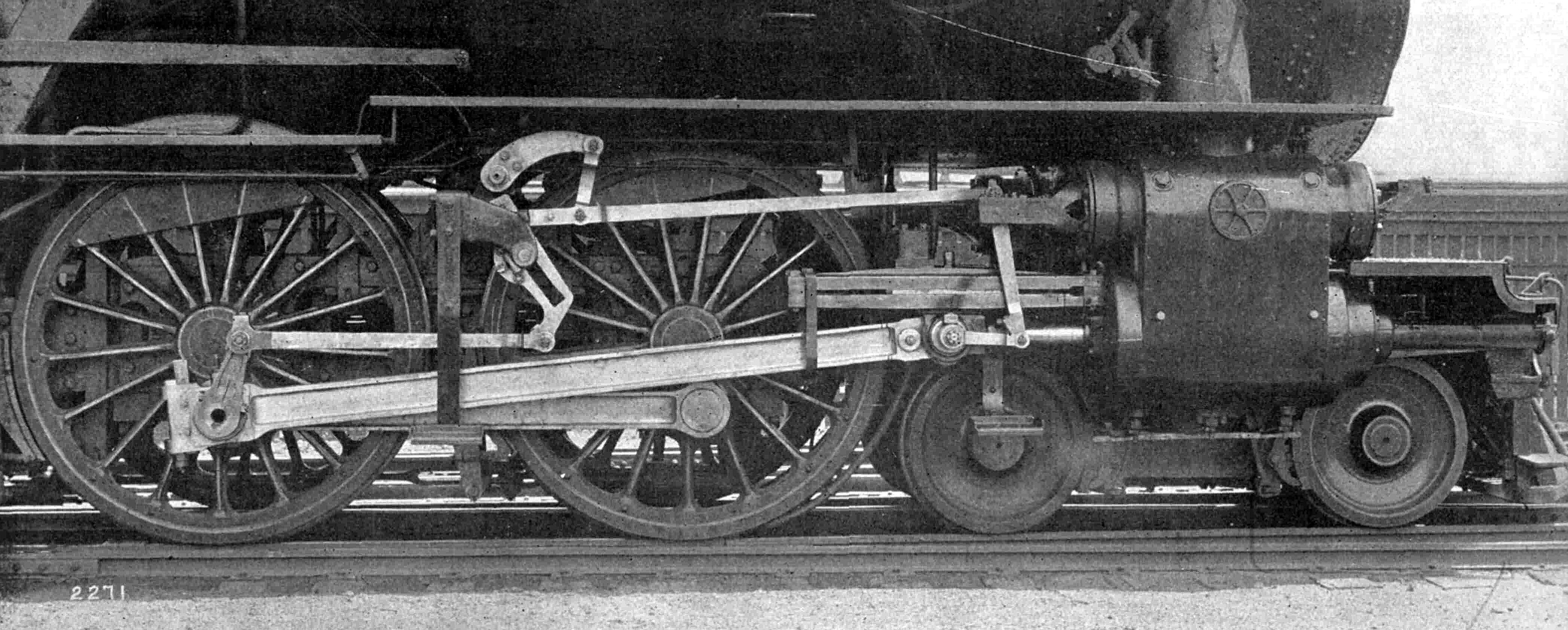|
Garstang And Knot-End Railway
The was a railway line, between Garstang and Pilling, across the Fylde of Lancashire, England. It was built by local agricultural interests to develop unproductive land. It had been intended to continue to Knott End but ran out of money. It eventually opened in 1870. In 1898 the Knott End Railway (KER) was authorised to continue to Knott End; it opened in 1908. The two companies were associated and the KER acquired the earlier company. The KER was still desperately short of money, and local people who were owed money bought rolling stock to keep the company going. Salt extraction near Preesall became a dominant industry from 1890, and the railway conveyed some remarkable tonnages of salt (outward) and coal (inward, for power). The passenger service was discontinued in 1930 and the line closed completely in 1965. Authorisation In the mid-nineteenth century, the tract of land to the west of Garstang, in the Fylde area of Lancashire, was an unworked expanse of moss. Attempts were ... [...More Info...] [...Related Items...] OR: [Wikipedia] [Google] [Baidu] |
Garstang
Garstang is an ancient market town and civil parish within the Wyre borough of Lancashire, England. It is north of the city of Preston and the same distance south of Lancaster. In 2011, the parish had a total resident population of 4,268; the larger Garstang Built-up Area, which includes the adjoining settlements of Bonds and Cabus, had population of 6,779. Garstang is famous for being the world's first ever Fairtrade Town. Etymology Garstang is mentioned in the Domesday Book as ''Cherestanc in 1086''. Later recordings of the name include Geresteng, Gairstang in 1195; Grestein, 1204; Gayrestan, 1236; Gayerstang, 1246; Gayrstang, 1274; Gayrestang, 1292. The original spelling of Garstang has several interpretations: "'gore by the boundary pole", "spear post", "triangular piece of land", "common land" or "meadowland". Possibly signifying the site of a meeting-space. The Old Norse derivation being 'geiri', a gore, from 'geirr', with 'stang' or 'stong', meaning "pole" or "bo ... [...More Info...] [...Related Items...] OR: [Wikipedia] [Google] [Baidu] |
Mersey Railway
The Mersey Railway was the first part of the passenger railway connecting the communities of Liverpool, Birkenhead, and now the rest of the Wirral Peninsula in England, which lie on opposite banks of the River Mersey, via the Mersey Railway Tunnel. The railway opened in 1886 with four stations using steam locomotives hauling unheated wooden carriages; in the next six years the line was extended and three more stations opened. Using the first tunnel under the Mersey the line is the world's oldest underground railway outside London. Because the steam locomotives created a polluted atmosphere in the tunnel, many passengers reverted to using the river ferries and the railway was bankrupt by 1900. Recovery came after the railway adopted electric traction in 1903. The Mersey Railway remained independent after the railway grouping of 1923, although it became closely integrated with the electric train services operated by the London, Midland and Scottish Railway over the former Wirral ... [...More Info...] [...Related Items...] OR: [Wikipedia] [Google] [Baidu] |
Early British Railway Companies
{{disambiguation, geo ...
Early may refer to: History * The beginning or oldest part of a defined historical period, as opposed to middle or late periods, e.g.: ** Early Christianity ** Early modern Europe Places in the United States * Early, Iowa * Early, Texas * Early Branch, a stream in Missouri * Early County, Georgia Other uses * ''Early'' (Scritti Politti album), 2005 * ''Early'' (A Certain Ratio album), 2002 * Early (name) * Early effect, an effect in transistor physics * Early Records, a record label * the early part of the morning See also * Earley (other) Earley is a town in England. Earley may also refer to: * Earley (surname), a list of people with the surname Earley * Earley (given name), a variant of the given name Earlene * Earley Lake, a lake in Minnesota *Earley parser, an algorithm *Earley ... [...More Info...] [...Related Items...] OR: [Wikipedia] [Google] [Baidu] |
Rail Transport In Lancashire
Rail or rails may refer to: Rail transport *Rail transport and related matters *Rail (rail transport) or railway lines, the running surface of a railway Arts and media Film * ''Rails'' (film), a 1929 Italian film by Mario Camerini * ''Rail'' (1967 film), a film by Geoffrey Jones for British Transport Films *'' Mirattu'' or ''Rail'', a Tamil-language film and its Telugu dub Magazines * ''Rail'' (magazine), a British rail transport periodical * ''Rails'' (magazine), a former New Zealand based rail transport periodical Other arts *The Rails, a British folk-rock band * Rail (theater) or batten, a pipe from which lighting, scenery, or curtains are hung Technology *Rails framework or Ruby on Rails, a web application framework *Rail system (firearms), a mounting system for firearm attachments *Front engine dragster *Runway alignment indicator lights, a configuration of an approach lighting system *Rule Augmented Interconnect Layout, a specification for expressing guidelines for prin ... [...More Info...] [...Related Items...] OR: [Wikipedia] [Google] [Baidu] |
Historic Transport In Lancashire
History (derived ) is the systematic study and the documentation of the human activity. The time period of event before the History of writing#Inventions of writing, invention of writing systems is considered prehistory. "History" is an umbrella term comprising past events as well as the memory, discovery, collection, organization, presentation, and interpretation of these events. Historians seek knowledge of the past using historical sources such as written documents, oral accounts, art and material artifacts, and ecological markers. History is not complete and still has debatable mysteries. History is also an Discipline (academia), academic discipline which uses narrative to describe, examine, question, and analyze past events, and investigate their patterns of cause and effect. Historians often debate which narrative best explains an event, as well as the significance of different causes and effects. Historians also debate the historiography, nature of history as an end in ... [...More Info...] [...Related Items...] OR: [Wikipedia] [Google] [Baidu] |
BackTrack (magazine)
''BackTrack'' is a monthly magazine, published by Pendragon Publishing, concentrating on researched articles and photographic features about British and Irish railway history. It is available through newsagents in the UK and by subscription from the publisher, but does not rely on advertising income and therefore does not publish an ABC circulation figure. History The magazine was founded in 1986 by Nigel Trevena, of Atlantic Transport Publishers (based in Truro, Cornwall), for the purpose of "recording Britain's railway history" (strapline until mid-1993). The editorial in the 'introductory issue' promised that each issue would contain "at least one article on each or the ' Big Four' companies ... (or their respective BR region)", would have "a branch line article in every issue" and would ''ignore'' current developments and the preservation scene. The magazine generally adheres to these principles even today, and it claims to be the leading (general purpose) railway histor ... [...More Info...] [...Related Items...] OR: [Wikipedia] [Google] [Baidu] |
The Railway Magazine
''The Railway Magazine'' is a monthly British railway magazine, aimed at the railway enthusiast market, that has been published in London since July 1897. it was, for three years running, the railway magazine with the largest circulation in the United Kingdom, having a monthly average sale during 2009 of 34,715 (the figure for 2007 being 34,661). It was published by IPC Media until October 2010, with , and in 2007 won IPC's 'Magazine of the Year' award. Since November 2010, ''The Railway Magazine'' has been published by Mortons of Horncastle. History ''The Railway Magazine'' was launched by Joseph Lawrence and ex-railwayman Frank E. Cornwall of Railway Publishing Ltd, who thought there would be an amateur enthusiast market for some of the material they were then publishing in a railway staff magazine, the ''Railway Herald''. They appointed as its first editor a former auctioneer, George Augustus Nokes (1867–1948), who wrote under the pseudonym "G. A. Sekon". He quickly bui ... [...More Info...] [...Related Items...] OR: [Wikipedia] [Google] [Baidu] |
Isaacson's Patent Valve Gear
The valve gear of a steam engine is the mechanism that operates the inlet and exhaust valves to admit steam into the cylinder (engine), cylinder and allow exhaust steam to escape, respectively, at the correct points in the cycle. It can also serve as a reversing gear. It is sometimes referred to as the "motion". Purpose In the simple case, this can be a relatively simple task as in the internal combustion engine in which the valves always open and close at the same points. This is not the ideal arrangement for a steam engine, though, because greatest power is achieved by keeping the inlet valve open throughout the power stroke (thus having full boiler pressure, minus transmission losses, against the piston throughout the stroke) while peak efficiency is achieved by only having the inlet valve open for a short time and then letting the steam expand in the cylinder (expansive working). The point at which steam stops being admitted to the cylinder is known as the ''Cutoff (steam e ... [...More Info...] [...Related Items...] OR: [Wikipedia] [Google] [Baidu] |
Hudswell Clarke
Hudswell, Clarke and Company Limited was an engineering and locomotive building company in Jack Lane, Hunslet, Leeds, West Yorkshire, England. History The company was founded as Hudswell and Clarke in 1860. In 1870 the name was changed to Hudswell, Clarke and Rodgers. There was another change in 1881 to Hudswell, Clarke and Company. The firm became a limited company in 1899. In 1862, soon after the company had been formed, they were given the initial design work on William Hamond Bartholomew's compartment boats for the Aire and Calder Navigation. The choice of the company may have been influenced by the fact that Bartholomew, the chief engineer for the Navigation, and William Clayton, one of the founders of Hudswell and Clarke, both lived on Spencer Place in Leeds. They produced at least one of the prototype Tom Pudding compartments, but did not get the main contract for their production once the design work had been done. As steam locomotive builders, like many of the sm ... [...More Info...] [...Related Items...] OR: [Wikipedia] [Google] [Baidu] |
Manning Wardle
Manning Wardle was a steam locomotive manufacturer based in Hunslet, Leeds, West Yorkshire, England. Precursor companies The city of Leeds was one of the earliest centres of locomotive building; Matthew Murray built the first commercially successful steam locomotive, ''Salamanca'', in Holbeck, Leeds, in 1812. By 1856, a number of manufacturers had sprung up in the city, including Kitson and Company, and E. B. Wilson and Company, later The Railway Foundry after 1848. Manning Wardle The Railway Foundry (E.B Wilson from 1838-48) operated in Leeds until 1858. At least some of the company's designs and some materials were purchased by Manning Wardle & Company, who located their Boyne Engine Works in Jack Lane in the Hunslet district of the city. Steam locomotive construction commenced on the site in 1859. Within the next few years, two other companies, the Hunslet Engine Company and Hudswell, Clarke & Company also opened premises in Jack Lane. There was a good deal of st ... [...More Info...] [...Related Items...] OR: [Wikipedia] [Google] [Baidu] |
Black, Hawthorn & Company
Black, Hawthorn and Company was a steam locomotive manufacturer with a works situated in Gateshead, Tyne and Wear, UK. John Coulthard and Son The Quarry Field Works was opened in 1835 by John and Ralph Coulthard, known as John Coulthard and Son which became R. Coulthard and Company in 1853 when the partnership was dissolved. Their first loco was York, Newcastle and Berwick Railway number 156, a to the Jenny Lind pattern. There followed more of the same and several engines. Although the works numbers went up to 100, probably only twenty were new, since the company carried out a great deal of rebuilding work. Black, Hawthorn & Co In 1865 Ralph Coulthard retired and the works was taken over by William Black and Thomas Hawthorn, who concentrated on industrial tank locomotives, both four and six coupled. The company supplied steam locomotives to collieries and works, particularly in North East England. They also built a number of crane engines. Some of the locomotives were very ... [...More Info...] [...Related Items...] OR: [Wikipedia] [Google] [Baidu] |
London, Midland And Scottish Railway
The London, Midland and Scottish Railway (LMSIt has been argued that the initials LMSR should be used to be consistent with LNER, GWR and SR. The London, Midland and Scottish Railway's corporate image used LMS, and this is what is generally used in historical circles. The LMS occasionally also used the initials LM&SR. For consistency, this article uses the initials LMS.) was a British railway company. It was formed on 1 January 1923 under the Railways Act of 1921, which required the grouping of over 120 separate railways into four. The companies merged into the LMS included the London and North Western Railway, Midland Railway, the Lancashire and Yorkshire Railway (which had previously merged with the London and North Western Railway on 1 January 1922), several Scottish railway companies (including the Caledonian Railway), and numerous other, smaller ventures. Besides being the world's largest transport organisation, the company was also the largest commercial enterprise ... [...More Info...] [...Related Items...] OR: [Wikipedia] [Google] [Baidu] |



.jpg)



